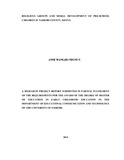| dc.description.abstract | Morality grows in human beings spontaneously alongside physical limbs, basic mental and social capacities. Children evolve maturity in moral thinking with the growing age. Further, children at any age can be presented with such creative activities that can accelerate their mental process. Children form ways of thinking through their experiences which include understandings of moral concepts such as equality, justice, rights, and human solidarity. There is a world- wide revival of interest in spiritual, moral and religious education. It takes a rather specific and narrow form, when a nation seeks to hold onto its traditional values by creating a dogmatic instruction for school children in the traditional religion of that country. This study sought to investigate influence of Christian religious groups, Islamic religious groups and Hindu religious groups on the moral development of pre-school children in Nairobi County. The study was guided by the following research objectives; to investigate how the religious education programmes, family organizations, practices and beliefs offered by religious groups influenced the moral development of children. The study was conducted in eight (8) religious schools which were a representation of the three (3) religious groups that featured in the study. This research was carried out through use of a qualitative research design. The study targeted both private and public pre-schools in Nairobi County. Structured random sampling technique was used to select a sample size. The researcher used story telling technique, observation schedules and documentary analysis to collect data from the respondents. The researcher then grouped the data into different categories as was guided by the different objectives. Codes were then assigned to the data that had been collected qualitatively. Scores were awarded for each code which were later tallied and counted according to the themes. These were later analyzed using descriptive statistics which included percentages, frequency tables, figures and photographs. The results of the findings showed that the different religious groups relatively influenced the moral development of the children. From the findings of the study, each religious group was fairly able to manifest the aspects of moral development which in this case include independence, maturity, rationality, responsibility and altruism through the religious education programmes, religious group families, religious group beliefs and religious group practices. The findings showed that there was therefore no religious group that had been able to fully develop the moral development in children despite the fact that they had deeply inculcated the religious teachings in them. The researcher therefore recommended that the Ministry of Education should develop a curriculum that would cover the different moral aspects. Religious families would also be urged to unite as well as involve children in activities that would inculcate the moral aspects in them | en_US |

